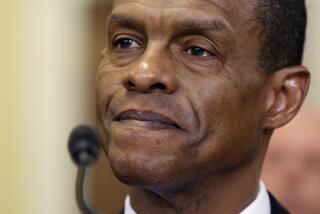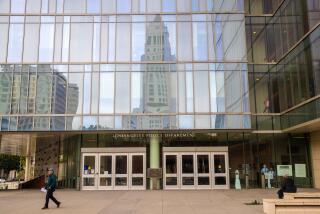Newton: After 12 years, a better LAPD
Although it was drowned out by the mayor’s race, Los Angeles quietly marked a historic moment this month: On May 15, after 12 years of policing the city under the eye of a federal judge, the Los Angeles Police Department at last was allowed to return to managing itself. That marks the end of a contentious yet intensely productive era, and it is a signal triumph for the man most responsible, Gerald Chaleff, who negotiated the consent decree in 2001, who oversaw its implementation and who witnessed its expiration.
“He signed the original copy,” Police Chief Charlie Beck, who was a captain of detectives in 2001, said of Chaleff. “He got us into this, and he got us out of it.”
The decree was effectively forced on the LAPD, over the reservations of its then-chief, Bernard C. Parks, and the city’s mayor, Richard Riordan. The Justice Department, responding to a history of police abuse that stretched back to the beating of Rodney G. King and included the revelations of the Rampart corruption scandal, threatened to file a lawsuit against the city unless it agreed to a host of reforms.
Chaleff, then the president of the Police Commission, negotiated the deal that produced the decree and ended the threat of litigation. In return for avoiding the suit, the city agreed to overhaul the LAPD’s systems for monitoring police officers, handling public complaints, overseeing gang units and confidential informants, investigating use of force by officers and for auditing itself, among other provisions.
Change was slow and difficult, and it unfolded amid furious politics. In early 2001, after the decree had been negotiated but before it was signed, Riordan fired Chaleff from the Police Commission. Later that year, James Hahn was elected mayor, and he rejected Parks’ request for a second term as chief. That cleared the way for the hiring of William J. Bratton, who brought Chaleff to the Police Department to serve directly under him. Chaleff remains there today, reporting now to Beck.
Meanwhile, the LAPD, sometimes grudgingly but with increasing determination, gradually embraced the reforms it once resented. The department’s audits now are widely respected. Gang units are more closely monitored. The department has revamped its systems for investigating allegations of excessive force.
But for longtime observers of the LAPD (I count as one, having covered the department from 1992 to 1997), what’s most notable is the rank-and-file attitude toward outside scrutiny. Officers who once balked at such oversight now accept it as essential to maintaining public confidence in their work.
The decree also pushed City Hall to respond. Council members approved money for auditors and invested in a computerized officer-tracking system first recommended after the King beating but unfinished until after the decree made it a priority. “What the consent decree created,” Beck said, “was universal support for those reforms.”
There have been crises in the years since the decree took effect. Police officers wheeled on demonstrators during a 2007 May Day march. Officers occasionally have been caught, sometimes on camera, using excessive force on suspects. And earlier this year, former LAPD Officer Christopher Dorner went on a violent rampage after complaining of mistreatment by the department.
But swift and sharp responses — after the May Day incident, for instance, Bratton demoted one senior officer while accepting personal responsibility for the police reaction — have kept problems from escalating into catastrophes. Public confidence in the LAPD is high, and crime, partly as a result, has continued to plummet here even as it has begun to climb in other cities.
Not every detail of the consent decree has held up. Beck noted that the document’s financial disclosure requirements for some officers, for instance, require them to turn over information regarding debt — disclosures that officers find intrusive and that don’t do much to help ferret out corruption. Some of those may be revised over time, but Beck promises that the philosophy of the decree is now ingrained in the department. The vast majority of LAPD officers have never known work without these reforms, and the command staff has been selected by two chiefs in part based on its ability to make them effective.
The era of the decree is over, but it has left a lasting and significant mark. “It served us very well,” Beck said.
Jim Newton’s column appears Mondays. His latest book is “Eisenhower: The White House Years.” Reach him at jim.newton@latimes.com or follow him on Twitter: @newton_jim.
More to Read
A cure for the common opinion
Get thought-provoking perspectives with our weekly newsletter.
You may occasionally receive promotional content from the Los Angeles Times.







